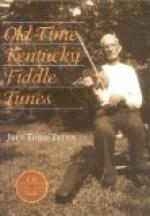“A rider of races,” said she; “a tamer of animals! What accomplishments! Do you actually live here, all alone?”
“Come,” said Madge, determined to be pleasant, “and I’ll show you.” She led the bluegrass girl to a convenient point from which her cabin was in sight.
“In that little hut!” said Barbara, not impressed as Madge had innocently thought she would be. “Shocking!”
The girl was angered, now. “So sorry I didn’t have your opinion afore! But, maybe, you wouldn’t think it were so awful, if you knowed how ’twere I come to live there.”
Frank had written something of the poor girl’s tragic story to his aunt. She was all interest. “Won’t you tell us, please?” she asked.
Holton seemed to show a strange disinclination to listen to the narrative. “Ain’t got no time for stories,” he objected. “Gettin’ late.”
“We’ll take time, then,” said Frank.
“Go on, little one,” urged Colonel Doolittle. “We’re listening.”
Impressed and touched by the sympathy in the horseman’s tone and the interest in Miss Alathea’s eyes, Madge told with even greater force and more effect than when she had related it to Layson the story of the tragedy which had robbed her at a blow of father and of mother, the black, dreadful tale of merciless assassination which had left her orphaned in the mountains. Her audience attended, spellbound, even the disgruntled and unsympathetic Barbara listening with unwilling fascination. Only Holton turned away, with a gesture of impatience. He plainly did not wish to waste time on the girl. Or was it that? He seemed to be uneasy as he walked to and fro upon the rock-ledge near them, whence, had he cared for it, he could have had a gorgeous view of mountain scenery. But, although he said, as plainly as he could without actual rudeness, that the girl and her sad tale of tragedy were not worth attention, he was not successful in his efforts wholly to refuse to listen to her.
“Infamous!” said Miss Alathea, when the child had finished.
“And that scoundrel has gone free!” exclaimed the Colonel, in disgust.
“That’s how I come to live alone, here,” Madge went on, addressing Barbara, particularly. The girl had made her feel it necessary to offer some defense. “After my mammy died I didn’t have no place to go, an’ so I just stayed on here, an’ th’ bridge my daddy built for his protection I have kept for mine. Maybe he has told you of it.” She indicated Frank. They nodded.
“And nothing has been heard of the infernal traitor, all these years?” the Colonel asked.
“He left the mountings when he found how folks was feelin’—they’d have shot him, like a dog, on sight. But it don’t make no differ where he goes; it don’t make a bit of differ where he goes.”
“What do you mean by that?” the Colonel asked, and as he spoke, Holton, suddenly intent, paused in his pacing of the ledge to listen.




